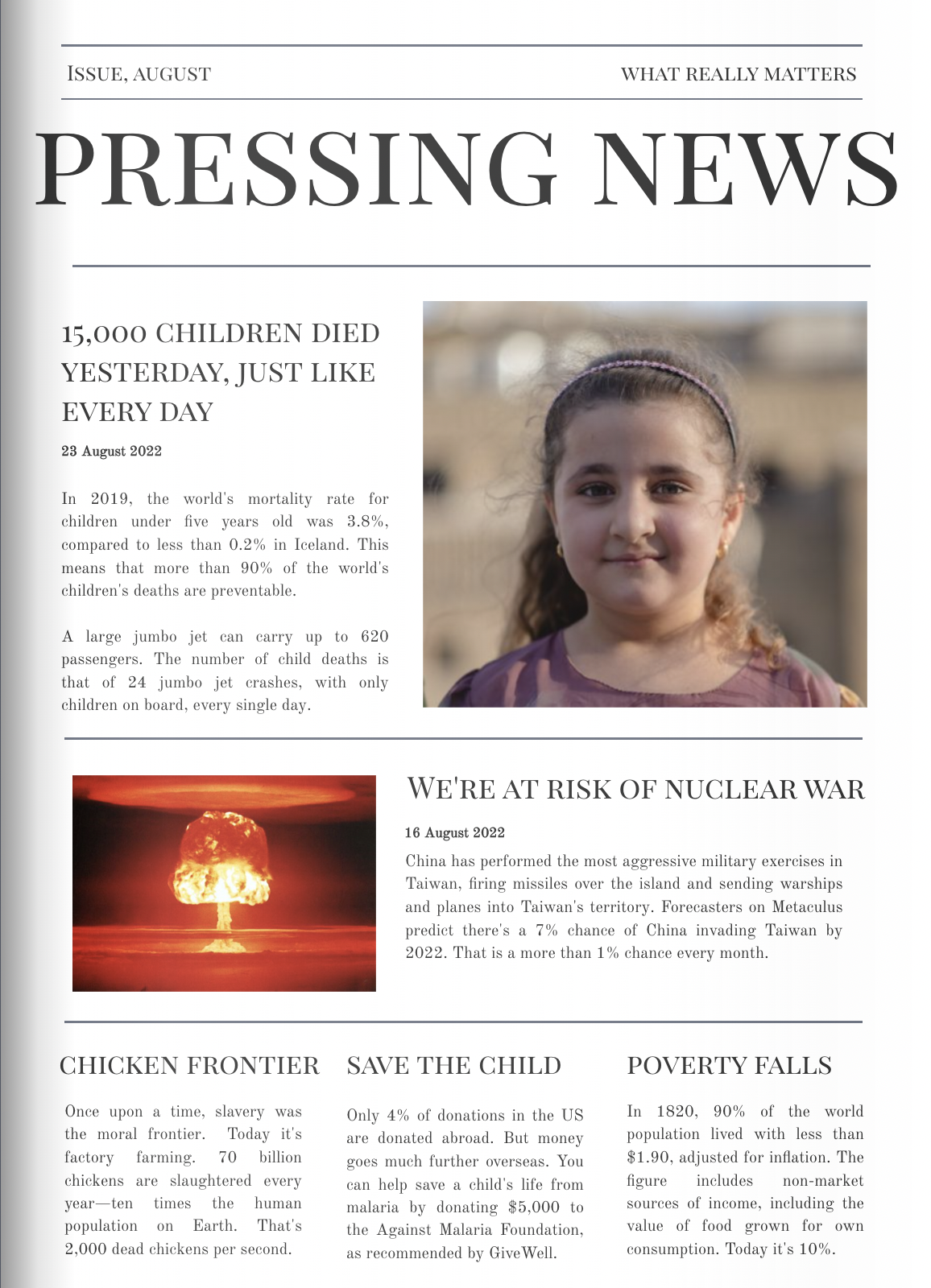What do AI risks, pandemics, and animal welfare have in common? They’re all in my quizzes! Test your knowledge on global health, animal welfare, and existential risks at Quizmanity. Who knew saving the world could be as simple as acing a quiz?
AndreFerretti
Article Summary: Current and Near-Term AI as a Potential Existential Risk Factor
I’ve set up a Manifold market for each of the 12 policy ideas discussed in the post, thanks to Michael Chen’s idea (Manifold uses collective wisdom to estimate the likelihood of events). You can visit the markets here and bet on whether the US will adopt these ideas by 2028. So go ahead and place your bets, because who said politics can’t be a bit of a gamble?
Great job! The design is impressively sleek. I wish I had this dashboard a few months ago when I was coming up with questions for an AI quiz. Congratulations.
Ciao Gio, it’s great tthat you’re into this topic! Check out the “Suggestions” part of the post for ideas on juggling innovation and safety. Chris has a point about being careful with open-sourcing advanced AI research. Plus, it’d be great if open-source teams created and shared their alignment studies. Who knows, maybe collaborating on alignment research will lead us to the next big breakthrough in AI. ;)
Navigating the Open-Source AI Landscape: Data, Funding, and Safety
“a white-collar worker alone in an office, 3 monitors full of text, a Great Wave Off Kanagawa crashes against the window, raining inside, extreme detail, bright and vibrant colours—v 4 --ar 3:2”
This was one of my first images on Midjourney, now my prompts are much simpler :)
New Artificial Intelligence quiz: can you beat ChatGPT?
Great list, thanks for sharing! I’m grateful for the inspiration you’ve given me — I created Quizmanity.org by working on one of your ideas ;)
By the way, a cousin of the achievements ledger is the AI Safety world map, which shows all the organizations working to reduce existential risk from AI.
‘The Humanity Times’ is a brilliant name! I’ve previously designed a front page that reflects a similar concept:
Very useful ! Instead of re-reading the longer explanation of value lock-in from the book, I found this brief explanation here, and it was just what I needed :)
Makes sense, thanks for your comment. You made me think that I should be more careful about the terms I use, and argue more from first principles. I’ll try doing this here:
I’m concerned about the growing trend of people and social-media platforms suppressing opposing opinions. I would love a world where people are free to speak their minds without fear of cancellation. If Big Tech and the government dictate what can and cannot be said, then everyone says the same things to avoid the risk of being banned from online platforms. To advance science and maintain freedom, you need to let people express innovative and unconventional ideas, which seem crazy at first and require free speech.
Thank you for your response, Peter. Though I was overly dramatic, the point was that cancel culture harms freedom of speech, without which there is no scientific progress or democracy. Burner accounts may be a symptom of this.
Oh dear, my comment didn’t fare well with downvotes. Perhaps it’s best to consider using a burner account for future discussions to avoid cancellation. :)
Cancel culture needs to be canceled.
On the other hand, you never miss a Forum post ;)
Yes it is! I also mentioned it in the post :)
Congrats!
Hey Cullen! Unfortunately, this is just an image that I designed and it’s not a real feature
Google Maps nuke-mode
Yes, I think the quality of the prompt is everything when it comes to output quality. You could give it one of your previous scripts and ask it to make a new one on topix X. I also found ChatGPT to be a great brainstormer. For example, you could feed it your existing video titles and ask it to suggest 5 additional topics.

Thanks for the insights! While reading your post, I noticed a lack of a summary — so I’ve distilled your key findings below. Feel free to add it to the original post if useful.
Unofficial Executive Summary
Clearer Thinking ran a study on 500 people exploring the relationship between anxiety and depression, which have a surprisingly high correlation (r=0.82). In short, anxiety reflects worry about potential future adversities, while depression is the feeling of not being able to experience a positive, meaningful life.
Despite these differences, anxiety and depression share many symptoms — including difficulties with sleep, fatigue, irritability, and concentration — although with subtle variations. The authors created an infographic that maps common thought patterns like “I have a low opinion of myself” to anxiety, depression, or both. Additionally, they designed another graphic linking cognitive distortions, such as catastrophizing, to the two conditions.